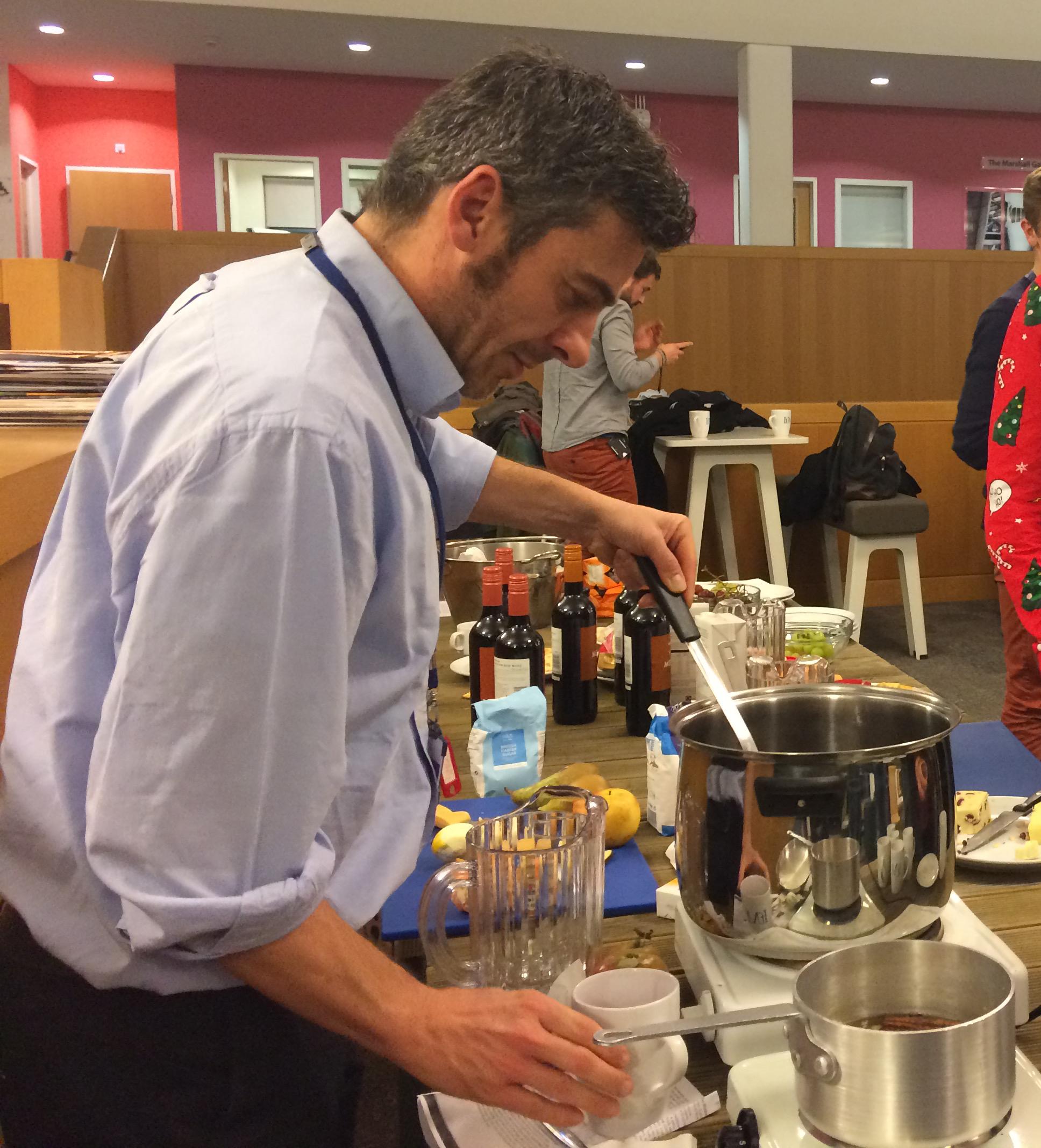
Submitted by Administrator on Fri, 16/12/2016 - 09:54
The Initiative's networking event for Early Career Researchers was reported in the Cambridge News. Here we provide more details and photographs from the evening.
Nothing quite says ‘Christmas party’ like the smell of mulled wine drifting around an office. It’s an easy drink to make – all of the ingredients can be purchased at your local supermarket. But have you ever wondered where the ingredients come from? Like Santa Claus, many of them have travelled halfway round the world to get here, say students from the Cambridge Global Food Security strategic research initiative.
To celebrate the festive period, they did what many offices do in the run-up to Christmas: organised an evening of mulled wine and cheese to bring everyone together. However, there was one difference, as Kirsten Van Fossen, a PhD student at Cambridge’s Institute for Manufacturing (IfM), who organised, the event explains:
“We asked researchers from across the university who are interested in issues of global food security to bring along mulled wine ingredients and to introduce their particular ingredient to the group – where they bought it, where it originates from and its journey to their store cupboard.”

The majority of the ingredients brought along were purchased at local supermarkets, where produce from every corner of the globe is readily available. However, as the students explained, many of the ingredients could be grown at home or in the UK, yet have travelled thousands of miles to reach the supermarket shelves.
Claire Lambe, who is studying for an MPhil in Engineering for Sustainable Development, brought along star anise. “This spice is grown exclusively for mass production in China and Vietnam, yet I found out you could grow it in your own garden in the UK under the right conditions,” she says.
Root ginger, too, can be grown in the UK if it is protected from the frost, says Chris Barton, a fourth year Manufacturing Engineering student at the IfM. “I bought this at Sainsbury’s, though,” he admits. “There’s no identification of the source on it, but the likelihood is that it came from the Tibetan Plateau, about 5,000 miles away.”
Clara Aranda, an Engineering PhD student from the IfM explains that as with many foods, her ingredient, vanilla, is no longer mass produced in its original country of origin. “Vanilla originally comes from Mexico, but after the Spaniards came and distributed it around the world, it now mainly comes from Madagascar.”
The evening included a stimulating talk and discussion led by guest speaker, Emilie Aguirre, who is an Academic Fellow at the Resnick Program for Food Law and Policy at UCLA School of Law. Emilie spoke about the local impacts of our increasingly globalised food system, drawing on her research into how macro-level laws, policies, and governance structures impact diet, health, and social inequalities. At one point in the discussion, Emilie demonstrated that it is difficult (and sometimes feels impossible) as consumers to shop our values in today's system. She posed the following to the group: “Consider this hypothetical situation. You are in the supermarket. You need to buy apples. Do you choose the organic apples from Spain or the non-organic but local apples from the UK? You are committed to changing the food system by shopping your values, but what happens when your values conflict? Which apples do you go for? Does your decision change if the organic apples came all the way from New Zealand instead of Spain?”

While the event was relaxed and informal, the message that underlies it is a serious one about our global food systems, which are coming under increasing strain from as ever-growing global population: mass production of food can drain resources, such as water, and is energy intensive; plant monoculture puts crops at risk of devastating diseases that can wipe out an entire harvest; food is transported all around the globe as consumers expect to be able to buy fresh ingredients all year round – even locally-grown produce can be transported all around the UK to be processed, bagged and then shipped to a local supermarket; and, while some people still starve, other countries – including the UK – face an epidemic of obesity from food saturated with sugars and fats.
“The food system – everything from how food is grown, processed and delivered, to how it is consumed – has become a truly global network,” adds Van Fossen. “But while it’s led to great advances in terms of food availability and strengthening international bonds of trade, it’s come with a cost to the environment and society. We wanted everyone to reflect on that.”
“We still have a lot of work to do to work out the right interplay between local and global food systems,” explains Jacqueline Garget, Coordinator of Cambridge Global Food Security. “Tonight’s mulled wine reception is like a microcosm of our strategic research initiative, bringing together researchers from across the university who are interested in building sustainable food systems. We want to provoke everyone to think about the issues we face and to search for potential solutions.”
Read the Cambridge News story here.
Ingredients
1 bottle red wine
75g caster sugar
1 orange
1 lemon
1 vanilla pod, sliced lengthways
2 bay leaves
1 cinnamon stick
1 star anise
4 cloves
½ teaspoon nutmeg
Thumb-sized piece of ginger, sliced
- Peel the orange and lemons using a vegetable peeler and squeeze the juices
- Pour the wine and juices into a pan and add the sliced ginger, together with the spices
- Heat the mixture, slowly adding the sugar until it has all dissolved.
- Just before the mixture boils, turn down the heat and simmer on a low heat for 10 minutes.
- Strain the mixture and serve.

